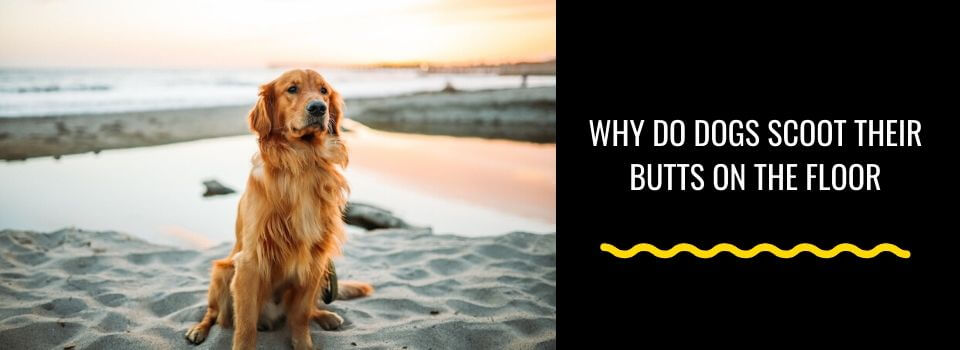Have you ever watched your beloved dog do a little “butt scoot” across the floor, leaving a trail of questionable debris in their wake? It’s a sight that can be both humorous and perplexing, leading many pet owners to wonder, “What on earth is going on?” This seemingly odd behavior is often a sign of discomfort or a medical issue, and it’s important to understand the potential causes to ensure your dog’s well-being.

Image: www.vet-organics.com
The act of scooting, also known as “sledding,” can be a symptom of various underlying issues, ranging from simple anal gland impaction to more serious conditions. While occasional scooting might be a minor annoyance, persistent or frequent scooting can be a sign of something more serious that requires veterinary attention. This article will delve into the common causes of dog scooting, helping you better understand this behavior and how to address it.
Common Causes of Dog Scooting:
1. Anal Gland Impaction:
Anal glands, located on either side of a dog’s anus, produce a foul-smelling fluid, usually emitted when a dog defecates or is frightened. Anal gland impaction occurs when this fluid becomes blocked within the glands, causing discomfort, swelling, and an irresistible urge to scoot.
Symptoms:
- Scooting
- Excessive licking around the anus
- Redness, swelling, or irritation near the anus
- A strong, unpleasant odor
- Pain upon defecation
Treatment: A veterinarian can manually express the anal glands, relieving the pressure and discomfort. In some cases, the glands might require regular expression, depending on the dog’s breed or individual predisposition. Maintaining a healthy diet and regular exercise can help prevent impaction.
2. Anal Saccule Disease:
This condition involves inflammation, infection, or irritation of the anal glands, often accompanied by pain, swelling, and redness. It can be caused by allergies, parasites, bacterial infections, or other factors.
Symptoms:
- Scooting
- Excessive licking around the anus
- Discharge from the anal glands
- Difficulty defecating
- Restlessness
Treatment: Vet treatment typically involves cleaning the anal glands, administering antibiotics if necessary, and addressing the underlying cause.

Image: www.pinterest.com
3. Parasites:
Worms, like roundworms, hookworms, and tapeworms, can cause anal itching and scooting. These parasites often reside in the digestive system and can trigger irritation around the anus.
Symptoms:
- Scooting
- Weight loss
- Diarrhea or constipation
- Vomiting
- Dull coat
Treatment: Deworming medications prescribed by a veterinarian are essential to resolve parasite-related scooting.
4. Allergies:
Food allergies, environmental allergens (pollen, dust mites, etc.), and contact allergens (certain fabrics, cleaning products) can trigger skin irritation, including around the anus, leading to scooting.
Symptoms:
- Scooting
- Excessive scratching
- Redness and itching
- Hair loss
Treatment: Diagnosing allergens and adjusting diet, environment, or lifestyle are crucial for managing allergies and relieving symptoms.
5. Skin Conditions:
A variety of skin conditions can lead to itching and scooting, such as scabies, ringworm, or other fungal infections.
Symptoms:
- Scooting
- Skin redness, scaling, or bumps
- Hair loss
- Crusting or scabbing
Treatment: A veterinary diagnosis and treatment plan are essential to address specific skin conditions and alleviate symptoms.
6. Foreign Objects:
Inserting objects into the anus, commonly seen in younger dogs, can cause irritation, pain, and an urge to scoot.
Symptoms:
- Visible object protruding from the anus
- Difficulty defecating
- Restlessness
- Pain or discomfort
Treatment: Seek immediate veterinary attention to remove the object safely.
When to See a Vet:
While occasional scooting might be a minor annoyance, if your dog displays persistent or frequent scooting, especially accompanied by other symptoms, it is essential to consult a veterinarian. They can properly diagnose the underlying cause and recommend appropriate treatment, preventing unnecessary discomfort and potential complications.
Expert Insights:
Dr. Sarah Jones, a renowned veterinarian, emphasizes the importance of addressing dog scooting promptly. “While it may seem like a minor nuisance, scooting can be a sign of more serious problems. If your dog continues to scoot despite home remedies, it’s essential to seek professional veterinary care,” she states.
Actionable Tips:
- Observe Your Dog: Carefully monitor your dog’s behavior, especially if they are scooting frequently. Note any other symptoms that might indicate a specific issue.
- Maintain a Clean Environment: Regularly bathe your dog and keep their bedding clean to prevent skin irritations and reduce the risk of parasites.
- Consult Your Vet: Don’t hesitate to seek veterinary care if your dog’s scooting persists or is accompanied by other concerning symptoms.
Why Do Dogs Scoot On The Floor
Conclusion:
Understanding the diverse causes of dog scooting can empower pet owners to address the issue effectively. Whether it’s a simple anal gland impaction or a more complex medical condition, prompt veterinary care is crucial to alleviate discomfort and ensure your dog’s health and happiness. By recognizing the signs, monitoring your dog’s behavior, and seeking professional assistance when necessary, you can provide your furry friend with the best possible care and prevent unnecessary distress.



/GettyImages-173599369-58ad68f83df78c345b829dfc.jpg?w=740&resize=740,414&ssl=1)


